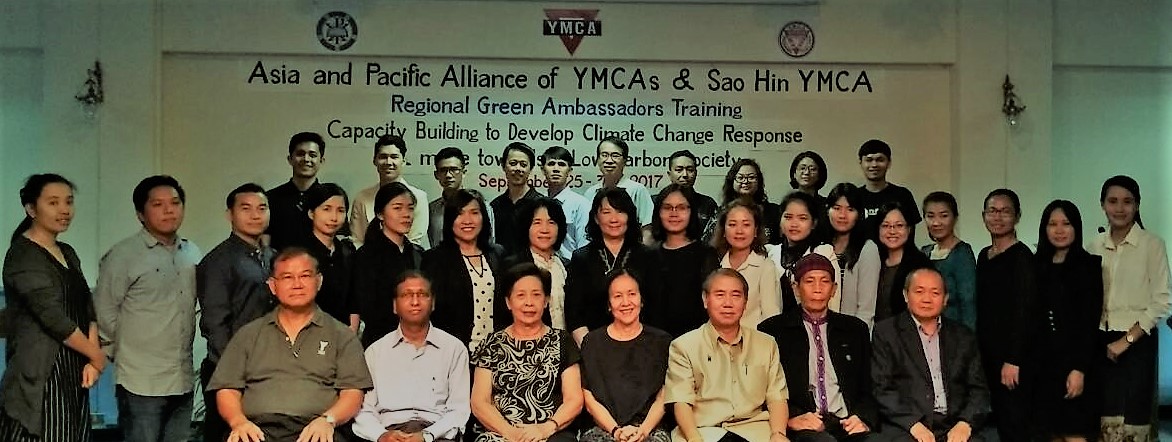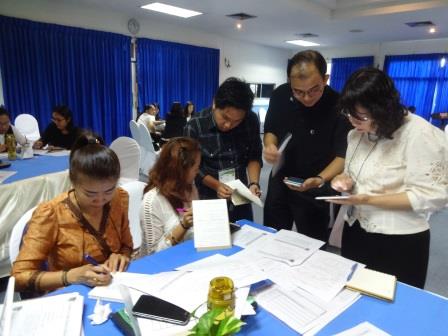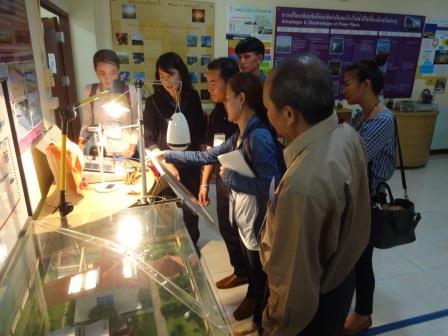APAY Sub-regional Green Ambassadors Training
Last Updated (Thursday, 12 October 2017 18:20)

The APAY Sub-regional Green Ambassador Training for the Greater Mekong Sub-region was held in Chiang Mai YMCA, Thailand during 25th to 30th September 2017. The theme of the training workshop was “Capacity Building to Develop Climate Change Response towards a Low Carbon Society”. This training was organized by Sao Hin YMCA of Chiang Mai, Thailand. Around 30 participants mostly youths from Thailand, Laos, Myanmar, Mongolia and Philippines participated at the event. Though most of the participants were from the YMCAs, there were participants also from various governmental and non-governmental organizations of these countries.
The program started with the welcome remarks from Mrs. Patcharin Sugunnasil, the Board of Directors of YMCA Chiang Mai. Mr. Takao Nishimura, Secretary General of the Y’s Men International, was also present and gave his welcome remarks to the participants.
The program was divided into different sessions and started with the overview of the training and expectations from the participants. The first topic was presented by Mr. Duncan Chowdhury, Executive Secretary of APAY, entitled “Environmental Protection and Combating Climate Change.” He also gave information about the APAY policy, the Green Ambassador Program and the APAY Green Fund and Green Award.
New ideas were also presented to the participants in a unique and easy interpreted workshop and games led by Mr. Robert Steele and Ms. Watkana Thongrueng, from Sustainability Asia, entitled, “Understanding Climate Change through System Thinking.” The topic talks about climate change as a system of cause and effect that interconnects from one another.
 Dr. Sathit Niamsuwan who works from Thailand Greenhouse Gas Emission Organization taught the participants about carbon emission calculations. The participants also learnt how to calculate carbon emission from energy and solid waste, and to calculate carbon emission reduction from trees. They were appraised about the Paris Agreement. During the training, the participants also shared their good practices from their own organizations as well as their individual efforts in combating climate change. Then Mr. Narupacha Muangin, from Sao Hin YMCA, also gave a lecture on Carbon Emission Reduction and Carbon Footprint Calculation.
Dr. Sathit Niamsuwan who works from Thailand Greenhouse Gas Emission Organization taught the participants about carbon emission calculations. The participants also learnt how to calculate carbon emission from energy and solid waste, and to calculate carbon emission reduction from trees. They were appraised about the Paris Agreement. During the training, the participants also shared their good practices from their own organizations as well as their individual efforts in combating climate change. Then Mr. Narupacha Muangin, from Sao Hin YMCA, also gave a lecture on Carbon Emission Reduction and Carbon Footprint Calculation.
During the field visit, the participants had the opportunity to visit Loung Neur Village in Doi Saket district which was home to Thai Leue tribe. They also visited Bor Sang Handicraft village located in Sankhampaeng District. The field visit emphasizes the importance of alternative tourism in reducing carbon footprints. The participants also visited the Energy and Environment Learning Center in Sao Hin YMCA which aims to promote environmentally friendly and low carbon life style. Ms. Patcharin Aviphan, Director of Sao Hin YMCA, also shared her experience on how to set up Green Team and promote Green Activities in their school and organizations. Participants gained ideas on how to set up their own green exhibit on their respective YMCAs, schools and organization.
On the final day of the training, Dr. Wasan Jompakdee, from The Coordinating Committee for the Protection of the Ping River Basin and the Environment, also gave a lecture titled, “Civil Movement for Environmental Preservation.” The lecture encourages the participants to engage and be active in environmental advocacies and green programs from different organizations.
 Before the training ended, the participants brainstormed together and developed action plans describing what environmental practices they are going to apply to their individual life, their community and their own YMCAs. Interesting activities are to set up Green Team in YMCA and school, awareness raising on climate change education, reduction of carbon emission and carbon footprint from daily life, environment conservation and electricity saving. Promote Green School and low carbon community garbage management and waste deduction including tree planting, growing organic vegetable as well as making compost.
Before the training ended, the participants brainstormed together and developed action plans describing what environmental practices they are going to apply to their individual life, their community and their own YMCAs. Interesting activities are to set up Green Team in YMCA and school, awareness raising on climate change education, reduction of carbon emission and carbon footprint from daily life, environment conservation and electricity saving. Promote Green School and low carbon community garbage management and waste deduction including tree planting, growing organic vegetable as well as making compost.
This training was a wonderful learning experience for a participant like me and will invariably encourage me to do more environmental programs in my YMCA and also be environmentally sensitive in my personal life. I am grateful to the organizers to give me the opportunity to participate in this program.
Chanthanome Chittavanh (Kimmy) / YMCA Group, Luang Probang, Laos
